ACC2005 Management Accounting Report: Budgeting and Analysis
VerifiedAdded on 2023/03/31
|9
|1303
|282
Report
AI Summary
This report provides an in-depth analysis of budgeting and its crucial role in management accounting. It begins by defining the budget as a process of forecasting future incomes and expenses, and then explores the technical aspects, including the application of tools and techniques for estimation and forecasting, and the non-technical aspects, such as its use as a managerial tool for controlling business activities, strategy building, and planning. The report highlights the importance of budgetary control in setting benchmarks, analyzing actual performance, and taking corrective measures. It also discusses the political context of budgeting, especially in government entities, and underscores its significance as an advanced management accounting tool applicable in all business organizations. Functional and master budgets are also discussed. The report concludes by emphasizing the value of budgetary control in effective business management, recommending its adoption for improved financial performance and management efficiency.
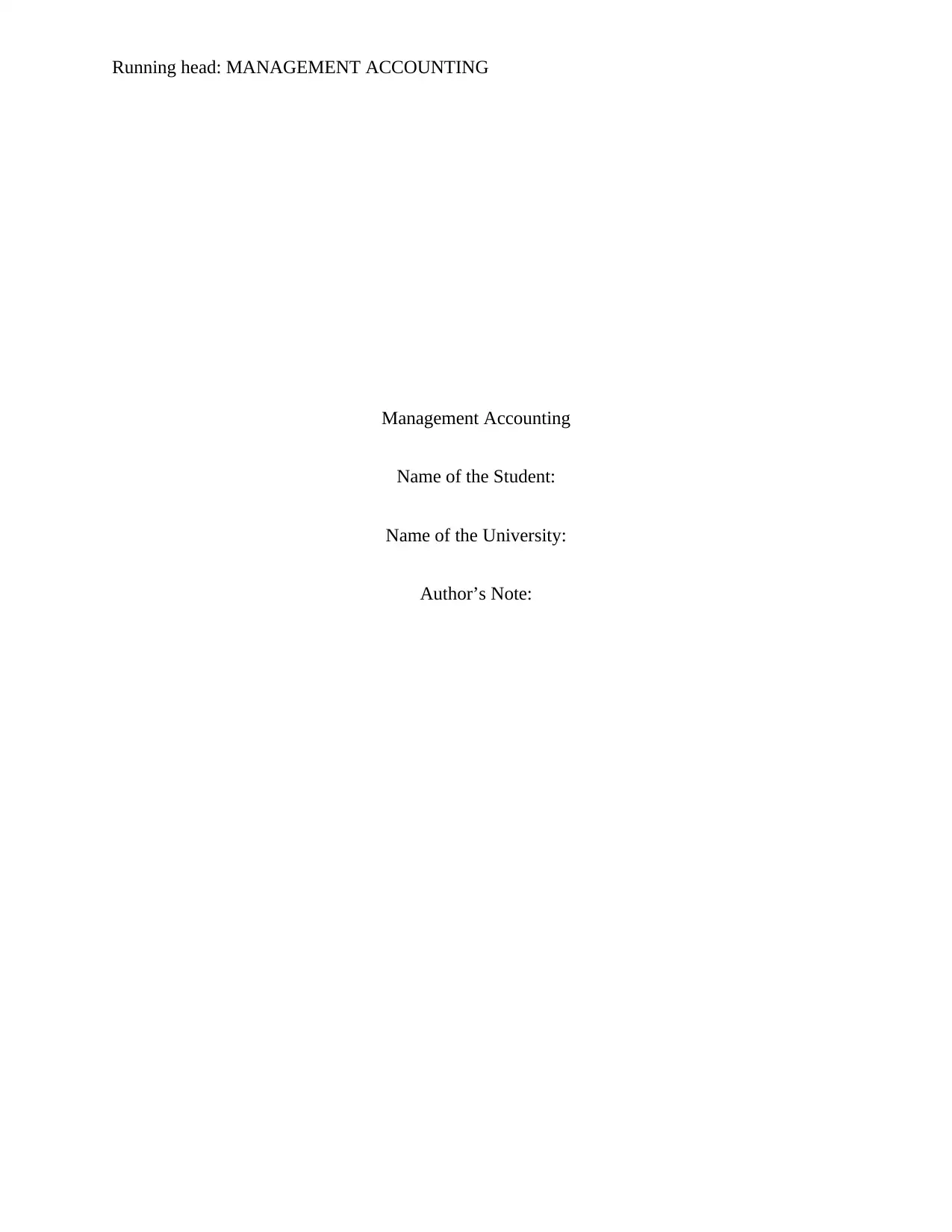
Running head: MANAGEMENT ACCOUNTING
Management Accounting
Name of the Student:
Name of the University:
Author’s Note:
Management Accounting
Name of the Student:
Name of the University:
Author’s Note:
Paraphrase This Document
Need a fresh take? Get an instant paraphrase of this document with our AI Paraphraser
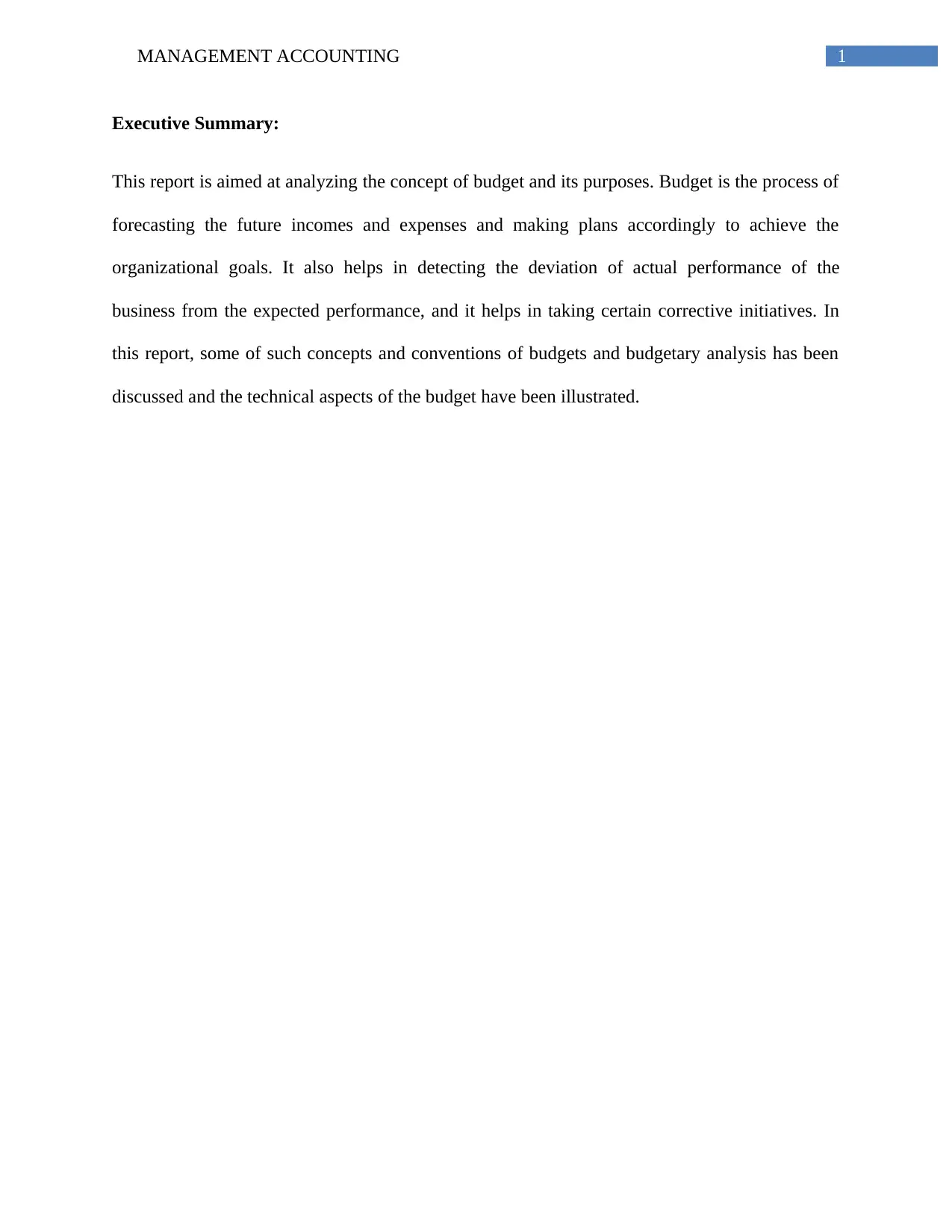
1MANAGEMENT ACCOUNTING
Executive Summary:
This report is aimed at analyzing the concept of budget and its purposes. Budget is the process of
forecasting the future incomes and expenses and making plans accordingly to achieve the
organizational goals. It also helps in detecting the deviation of actual performance of the
business from the expected performance, and it helps in taking certain corrective initiatives. In
this report, some of such concepts and conventions of budgets and budgetary analysis has been
discussed and the technical aspects of the budget have been illustrated.
Executive Summary:
This report is aimed at analyzing the concept of budget and its purposes. Budget is the process of
forecasting the future incomes and expenses and making plans accordingly to achieve the
organizational goals. It also helps in detecting the deviation of actual performance of the
business from the expected performance, and it helps in taking certain corrective initiatives. In
this report, some of such concepts and conventions of budgets and budgetary analysis has been
discussed and the technical aspects of the budget have been illustrated.
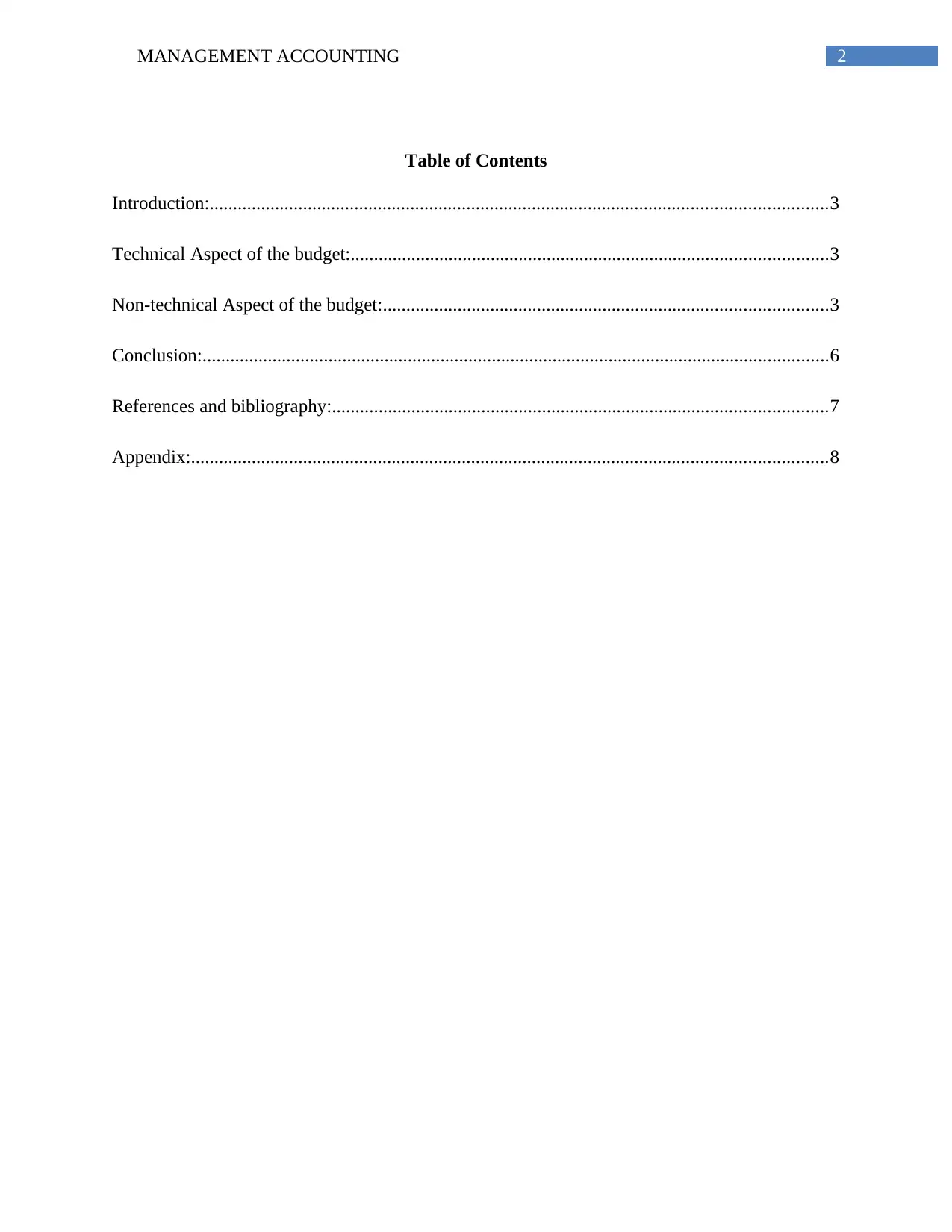
2MANAGEMENT ACCOUNTING
Table of Contents
Introduction:....................................................................................................................................3
Technical Aspect of the budget:......................................................................................................3
Non-technical Aspect of the budget:...............................................................................................3
Conclusion:......................................................................................................................................6
References and bibliography:..........................................................................................................7
Appendix:........................................................................................................................................8
Table of Contents
Introduction:....................................................................................................................................3
Technical Aspect of the budget:......................................................................................................3
Non-technical Aspect of the budget:...............................................................................................3
Conclusion:......................................................................................................................................6
References and bibliography:..........................................................................................................7
Appendix:........................................................................................................................................8
⊘ This is a preview!⊘
Do you want full access?
Subscribe today to unlock all pages.

Trusted by 1+ million students worldwide
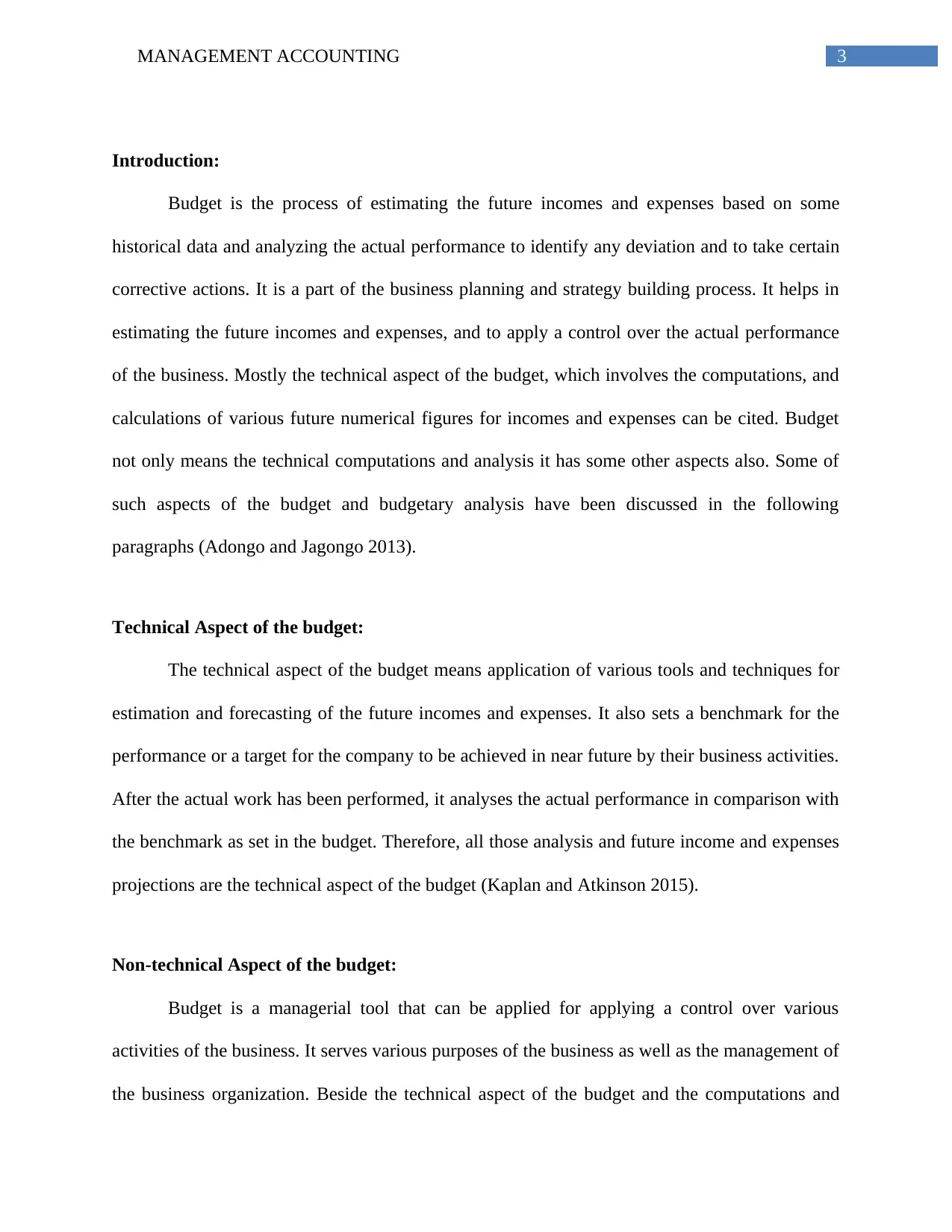
3MANAGEMENT ACCOUNTING
Introduction:
Budget is the process of estimating the future incomes and expenses based on some
historical data and analyzing the actual performance to identify any deviation and to take certain
corrective actions. It is a part of the business planning and strategy building process. It helps in
estimating the future incomes and expenses, and to apply a control over the actual performance
of the business. Mostly the technical aspect of the budget, which involves the computations, and
calculations of various future numerical figures for incomes and expenses can be cited. Budget
not only means the technical computations and analysis it has some other aspects also. Some of
such aspects of the budget and budgetary analysis have been discussed in the following
paragraphs (Adongo and Jagongo 2013).
Technical Aspect of the budget:
The technical aspect of the budget means application of various tools and techniques for
estimation and forecasting of the future incomes and expenses. It also sets a benchmark for the
performance or a target for the company to be achieved in near future by their business activities.
After the actual work has been performed, it analyses the actual performance in comparison with
the benchmark as set in the budget. Therefore, all those analysis and future income and expenses
projections are the technical aspect of the budget (Kaplan and Atkinson 2015).
Non-technical Aspect of the budget:
Budget is a managerial tool that can be applied for applying a control over various
activities of the business. It serves various purposes of the business as well as the management of
the business organization. Beside the technical aspect of the budget and the computations and
Introduction:
Budget is the process of estimating the future incomes and expenses based on some
historical data and analyzing the actual performance to identify any deviation and to take certain
corrective actions. It is a part of the business planning and strategy building process. It helps in
estimating the future incomes and expenses, and to apply a control over the actual performance
of the business. Mostly the technical aspect of the budget, which involves the computations, and
calculations of various future numerical figures for incomes and expenses can be cited. Budget
not only means the technical computations and analysis it has some other aspects also. Some of
such aspects of the budget and budgetary analysis have been discussed in the following
paragraphs (Adongo and Jagongo 2013).
Technical Aspect of the budget:
The technical aspect of the budget means application of various tools and techniques for
estimation and forecasting of the future incomes and expenses. It also sets a benchmark for the
performance or a target for the company to be achieved in near future by their business activities.
After the actual work has been performed, it analyses the actual performance in comparison with
the benchmark as set in the budget. Therefore, all those analysis and future income and expenses
projections are the technical aspect of the budget (Kaplan and Atkinson 2015).
Non-technical Aspect of the budget:
Budget is a managerial tool that can be applied for applying a control over various
activities of the business. It serves various purposes of the business as well as the management of
the business organization. Beside the technical aspect of the budget and the computations and
Paraphrase This Document
Need a fresh take? Get an instant paraphrase of this document with our AI Paraphraser
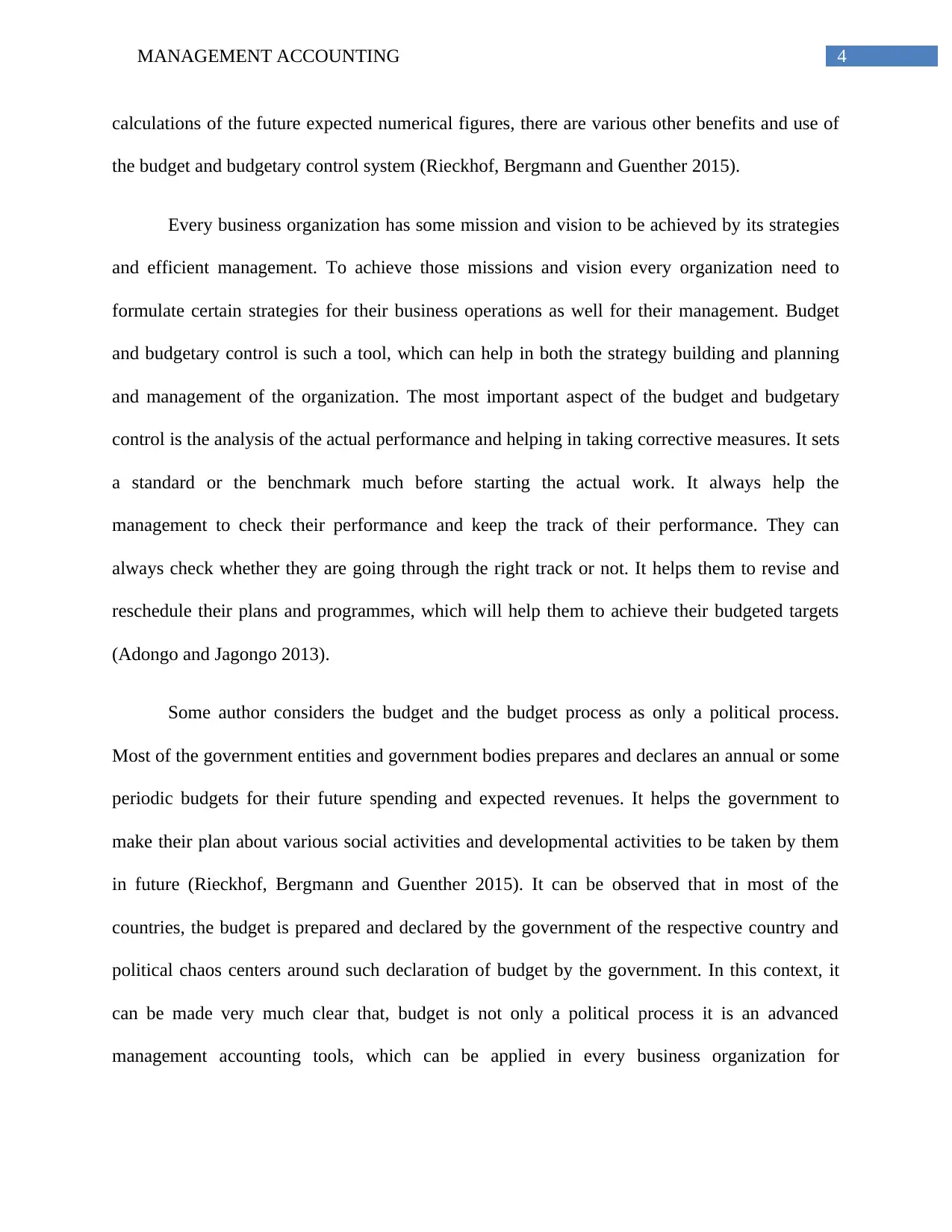
4MANAGEMENT ACCOUNTING
calculations of the future expected numerical figures, there are various other benefits and use of
the budget and budgetary control system (Rieckhof, Bergmann and Guenther 2015).
Every business organization has some mission and vision to be achieved by its strategies
and efficient management. To achieve those missions and vision every organization need to
formulate certain strategies for their business operations as well for their management. Budget
and budgetary control is such a tool, which can help in both the strategy building and planning
and management of the organization. The most important aspect of the budget and budgetary
control is the analysis of the actual performance and helping in taking corrective measures. It sets
a standard or the benchmark much before starting the actual work. It always help the
management to check their performance and keep the track of their performance. They can
always check whether they are going through the right track or not. It helps them to revise and
reschedule their plans and programmes, which will help them to achieve their budgeted targets
(Adongo and Jagongo 2013).
Some author considers the budget and the budget process as only a political process.
Most of the government entities and government bodies prepares and declares an annual or some
periodic budgets for their future spending and expected revenues. It helps the government to
make their plan about various social activities and developmental activities to be taken by them
in future (Rieckhof, Bergmann and Guenther 2015). It can be observed that in most of the
countries, the budget is prepared and declared by the government of the respective country and
political chaos centers around such declaration of budget by the government. In this context, it
can be made very much clear that, budget is not only a political process it is an advanced
management accounting tools, which can be applied in every business organization for
calculations of the future expected numerical figures, there are various other benefits and use of
the budget and budgetary control system (Rieckhof, Bergmann and Guenther 2015).
Every business organization has some mission and vision to be achieved by its strategies
and efficient management. To achieve those missions and vision every organization need to
formulate certain strategies for their business operations as well for their management. Budget
and budgetary control is such a tool, which can help in both the strategy building and planning
and management of the organization. The most important aspect of the budget and budgetary
control is the analysis of the actual performance and helping in taking corrective measures. It sets
a standard or the benchmark much before starting the actual work. It always help the
management to check their performance and keep the track of their performance. They can
always check whether they are going through the right track or not. It helps them to revise and
reschedule their plans and programmes, which will help them to achieve their budgeted targets
(Adongo and Jagongo 2013).
Some author considers the budget and the budget process as only a political process.
Most of the government entities and government bodies prepares and declares an annual or some
periodic budgets for their future spending and expected revenues. It helps the government to
make their plan about various social activities and developmental activities to be taken by them
in future (Rieckhof, Bergmann and Guenther 2015). It can be observed that in most of the
countries, the budget is prepared and declared by the government of the respective country and
political chaos centers around such declaration of budget by the government. In this context, it
can be made very much clear that, budget is not only a political process it is an advanced
management accounting tools, which can be applied in every business organization for
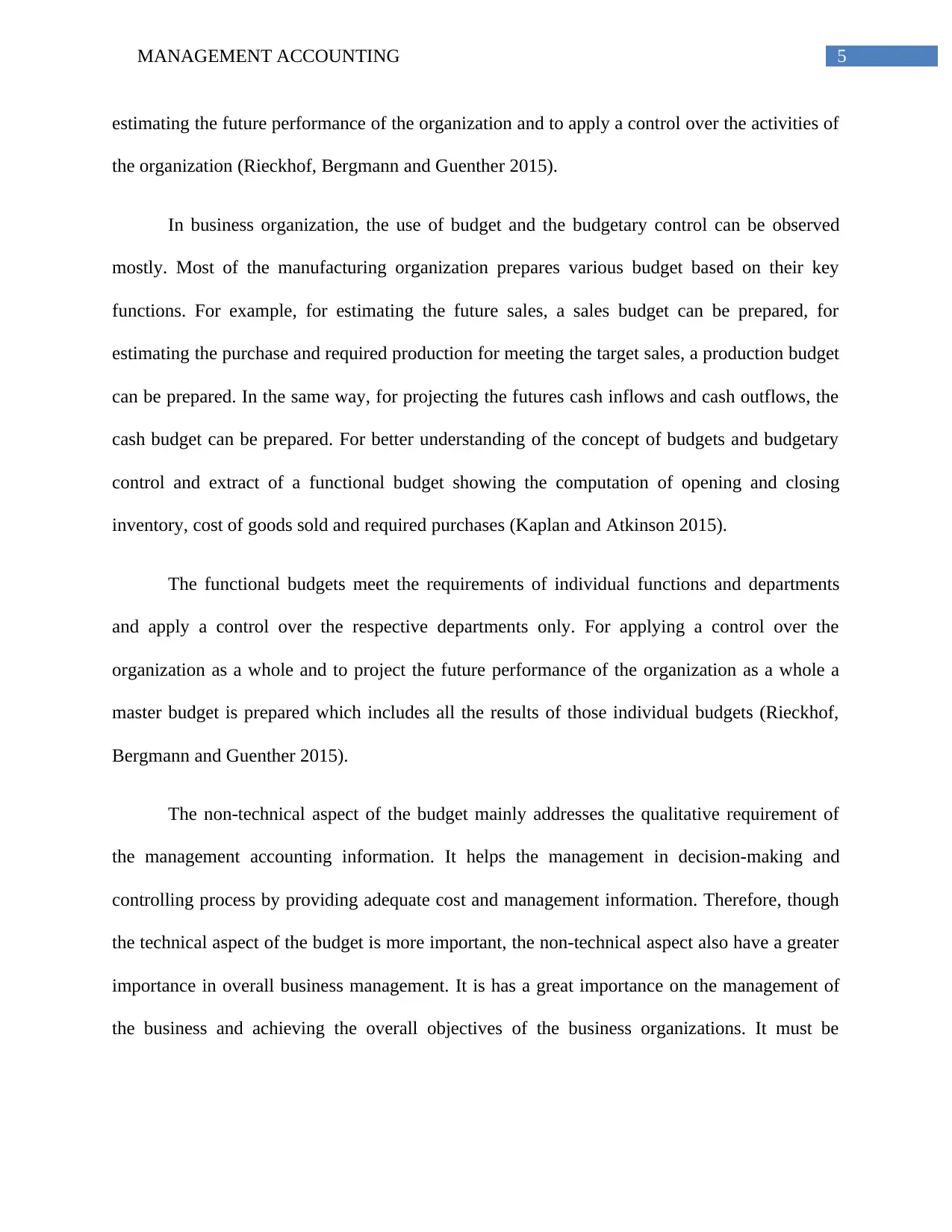
5MANAGEMENT ACCOUNTING
estimating the future performance of the organization and to apply a control over the activities of
the organization (Rieckhof, Bergmann and Guenther 2015).
In business organization, the use of budget and the budgetary control can be observed
mostly. Most of the manufacturing organization prepares various budget based on their key
functions. For example, for estimating the future sales, a sales budget can be prepared, for
estimating the purchase and required production for meeting the target sales, a production budget
can be prepared. In the same way, for projecting the futures cash inflows and cash outflows, the
cash budget can be prepared. For better understanding of the concept of budgets and budgetary
control and extract of a functional budget showing the computation of opening and closing
inventory, cost of goods sold and required purchases (Kaplan and Atkinson 2015).
The functional budgets meet the requirements of individual functions and departments
and apply a control over the respective departments only. For applying a control over the
organization as a whole and to project the future performance of the organization as a whole a
master budget is prepared which includes all the results of those individual budgets (Rieckhof,
Bergmann and Guenther 2015).
The non-technical aspect of the budget mainly addresses the qualitative requirement of
the management accounting information. It helps the management in decision-making and
controlling process by providing adequate cost and management information. Therefore, though
the technical aspect of the budget is more important, the non-technical aspect also have a greater
importance in overall business management. It is has a great importance on the management of
the business and achieving the overall objectives of the business organizations. It must be
estimating the future performance of the organization and to apply a control over the activities of
the organization (Rieckhof, Bergmann and Guenther 2015).
In business organization, the use of budget and the budgetary control can be observed
mostly. Most of the manufacturing organization prepares various budget based on their key
functions. For example, for estimating the future sales, a sales budget can be prepared, for
estimating the purchase and required production for meeting the target sales, a production budget
can be prepared. In the same way, for projecting the futures cash inflows and cash outflows, the
cash budget can be prepared. For better understanding of the concept of budgets and budgetary
control and extract of a functional budget showing the computation of opening and closing
inventory, cost of goods sold and required purchases (Kaplan and Atkinson 2015).
The functional budgets meet the requirements of individual functions and departments
and apply a control over the respective departments only. For applying a control over the
organization as a whole and to project the future performance of the organization as a whole a
master budget is prepared which includes all the results of those individual budgets (Rieckhof,
Bergmann and Guenther 2015).
The non-technical aspect of the budget mainly addresses the qualitative requirement of
the management accounting information. It helps the management in decision-making and
controlling process by providing adequate cost and management information. Therefore, though
the technical aspect of the budget is more important, the non-technical aspect also have a greater
importance in overall business management. It is has a great importance on the management of
the business and achieving the overall objectives of the business organizations. It must be
⊘ This is a preview!⊘
Do you want full access?
Subscribe today to unlock all pages.

Trusted by 1+ million students worldwide
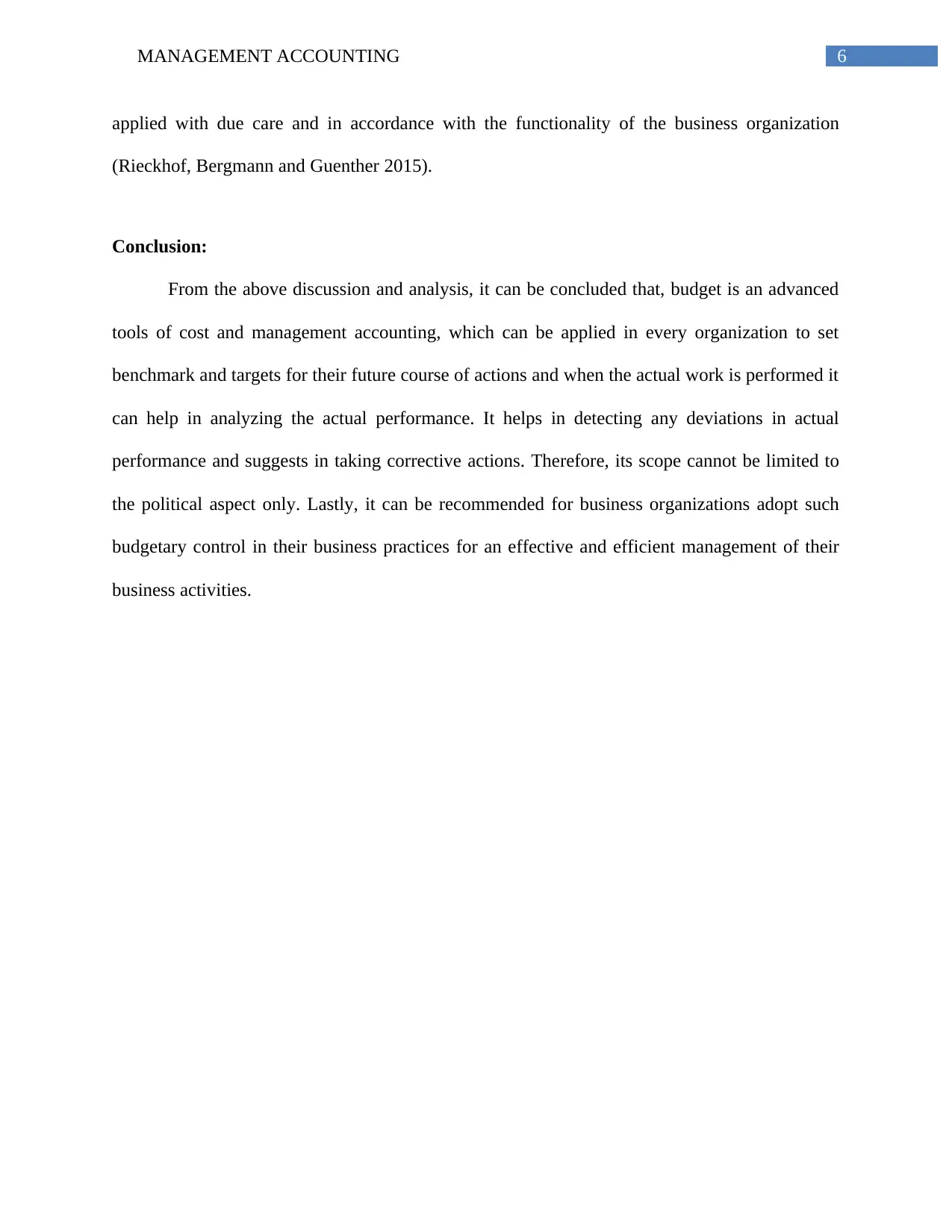
6MANAGEMENT ACCOUNTING
applied with due care and in accordance with the functionality of the business organization
(Rieckhof, Bergmann and Guenther 2015).
Conclusion:
From the above discussion and analysis, it can be concluded that, budget is an advanced
tools of cost and management accounting, which can be applied in every organization to set
benchmark and targets for their future course of actions and when the actual work is performed it
can help in analyzing the actual performance. It helps in detecting any deviations in actual
performance and suggests in taking corrective actions. Therefore, its scope cannot be limited to
the political aspect only. Lastly, it can be recommended for business organizations adopt such
budgetary control in their business practices for an effective and efficient management of their
business activities.
applied with due care and in accordance with the functionality of the business organization
(Rieckhof, Bergmann and Guenther 2015).
Conclusion:
From the above discussion and analysis, it can be concluded that, budget is an advanced
tools of cost and management accounting, which can be applied in every organization to set
benchmark and targets for their future course of actions and when the actual work is performed it
can help in analyzing the actual performance. It helps in detecting any deviations in actual
performance and suggests in taking corrective actions. Therefore, its scope cannot be limited to
the political aspect only. Lastly, it can be recommended for business organizations adopt such
budgetary control in their business practices for an effective and efficient management of their
business activities.
Paraphrase This Document
Need a fresh take? Get an instant paraphrase of this document with our AI Paraphraser
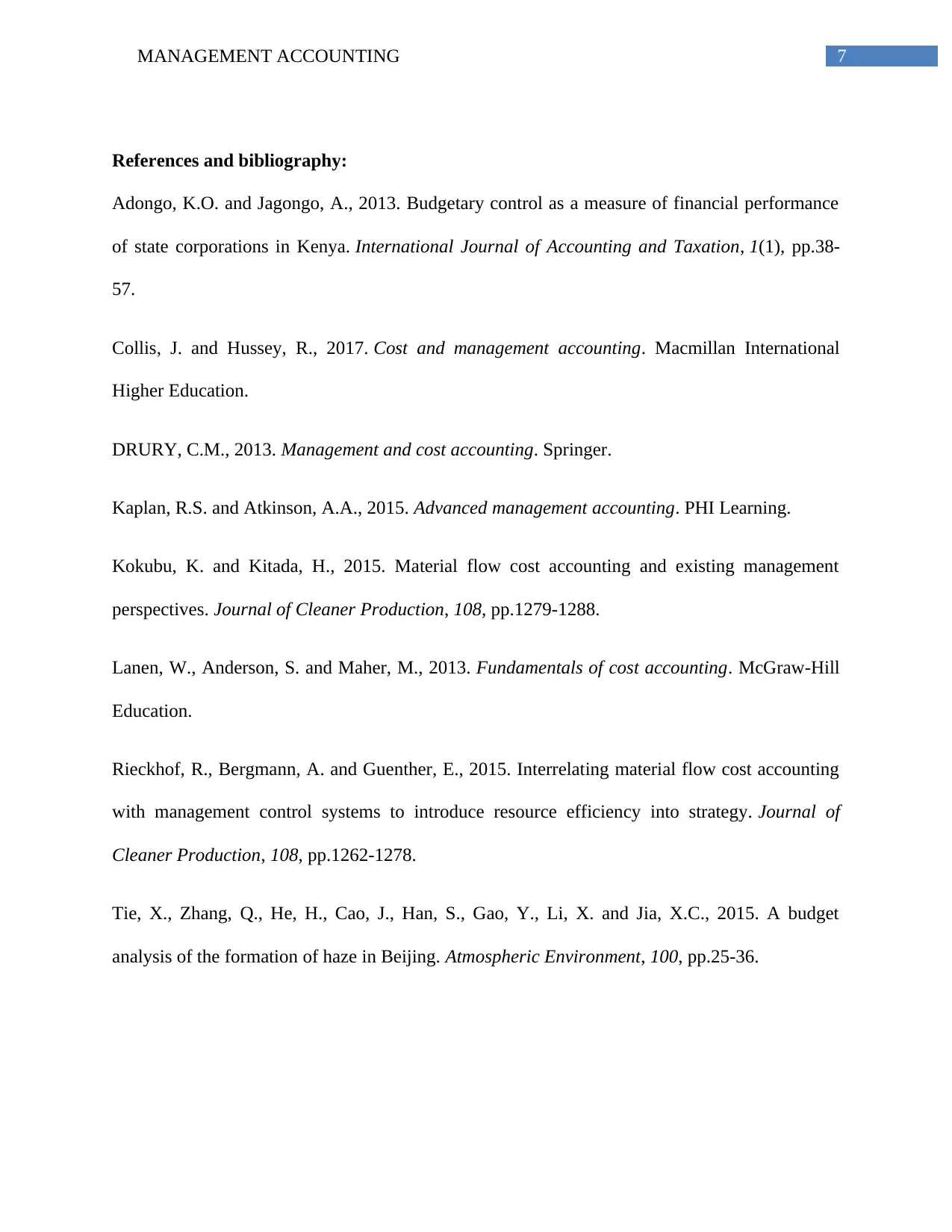
7MANAGEMENT ACCOUNTING
References and bibliography:
Adongo, K.O. and Jagongo, A., 2013. Budgetary control as a measure of financial performance
of state corporations in Kenya. International Journal of Accounting and Taxation, 1(1), pp.38-
57.
Collis, J. and Hussey, R., 2017. Cost and management accounting. Macmillan International
Higher Education.
DRURY, C.M., 2013. Management and cost accounting. Springer.
Kaplan, R.S. and Atkinson, A.A., 2015. Advanced management accounting. PHI Learning.
Kokubu, K. and Kitada, H., 2015. Material flow cost accounting and existing management
perspectives. Journal of Cleaner Production, 108, pp.1279-1288.
Lanen, W., Anderson, S. and Maher, M., 2013. Fundamentals of cost accounting. McGraw-Hill
Education.
Rieckhof, R., Bergmann, A. and Guenther, E., 2015. Interrelating material flow cost accounting
with management control systems to introduce resource efficiency into strategy. Journal of
Cleaner Production, 108, pp.1262-1278.
Tie, X., Zhang, Q., He, H., Cao, J., Han, S., Gao, Y., Li, X. and Jia, X.C., 2015. A budget
analysis of the formation of haze in Beijing. Atmospheric Environment, 100, pp.25-36.
References and bibliography:
Adongo, K.O. and Jagongo, A., 2013. Budgetary control as a measure of financial performance
of state corporations in Kenya. International Journal of Accounting and Taxation, 1(1), pp.38-
57.
Collis, J. and Hussey, R., 2017. Cost and management accounting. Macmillan International
Higher Education.
DRURY, C.M., 2013. Management and cost accounting. Springer.
Kaplan, R.S. and Atkinson, A.A., 2015. Advanced management accounting. PHI Learning.
Kokubu, K. and Kitada, H., 2015. Material flow cost accounting and existing management
perspectives. Journal of Cleaner Production, 108, pp.1279-1288.
Lanen, W., Anderson, S. and Maher, M., 2013. Fundamentals of cost accounting. McGraw-Hill
Education.
Rieckhof, R., Bergmann, A. and Guenther, E., 2015. Interrelating material flow cost accounting
with management control systems to introduce resource efficiency into strategy. Journal of
Cleaner Production, 108, pp.1262-1278.
Tie, X., Zhang, Q., He, H., Cao, J., Han, S., Gao, Y., Li, X. and Jia, X.C., 2015. A budget
analysis of the formation of haze in Beijing. Atmospheric Environment, 100, pp.25-36.
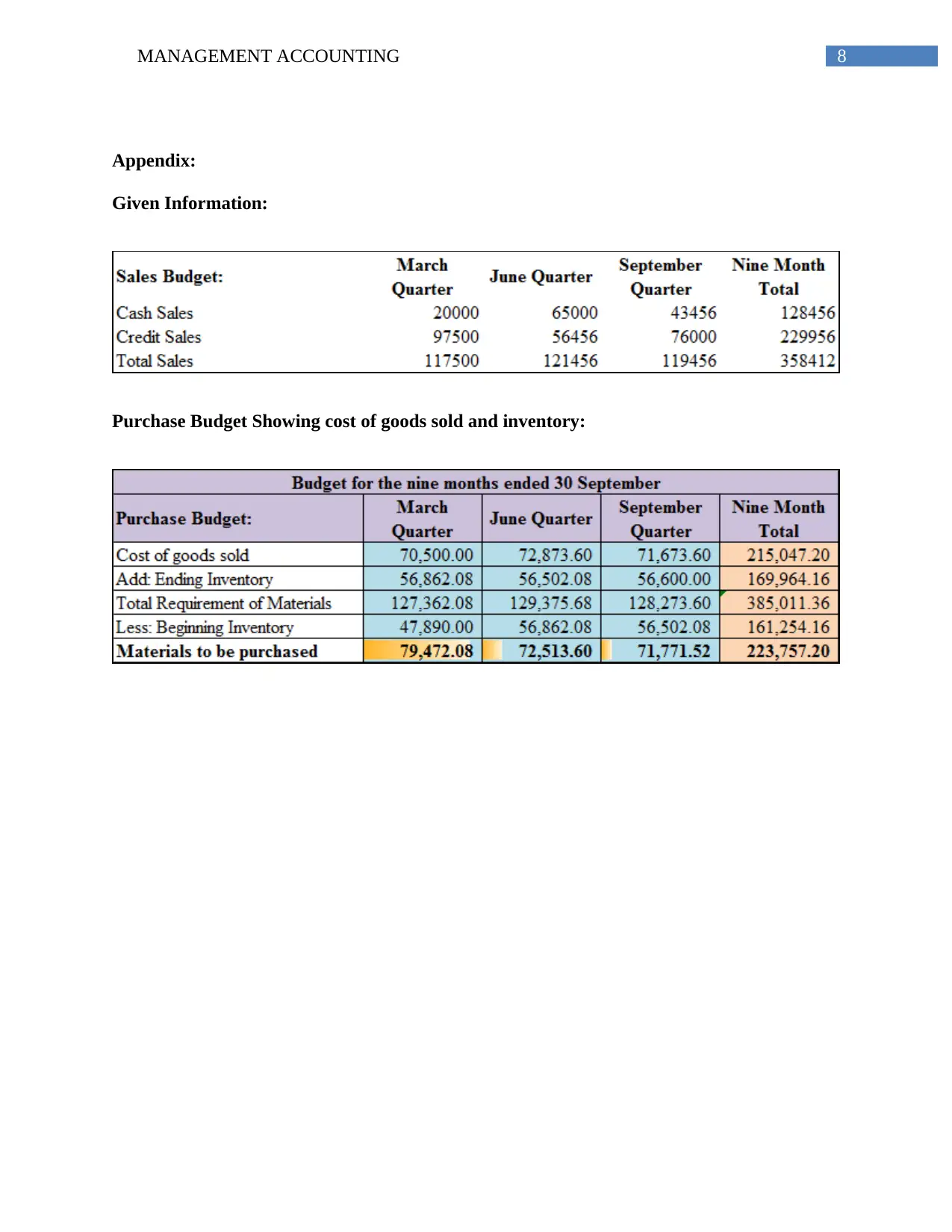
8MANAGEMENT ACCOUNTING
Appendix:
Given Information:
Purchase Budget Showing cost of goods sold and inventory:
Appendix:
Given Information:
Purchase Budget Showing cost of goods sold and inventory:
⊘ This is a preview!⊘
Do you want full access?
Subscribe today to unlock all pages.

Trusted by 1+ million students worldwide
1 out of 9
Related Documents
Your All-in-One AI-Powered Toolkit for Academic Success.
+13062052269
info@desklib.com
Available 24*7 on WhatsApp / Email
![[object Object]](/_next/static/media/star-bottom.7253800d.svg)
Unlock your academic potential
Copyright © 2020–2025 A2Z Services. All Rights Reserved. Developed and managed by ZUCOL.





